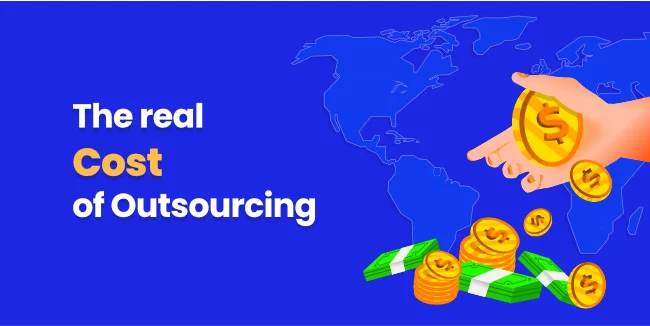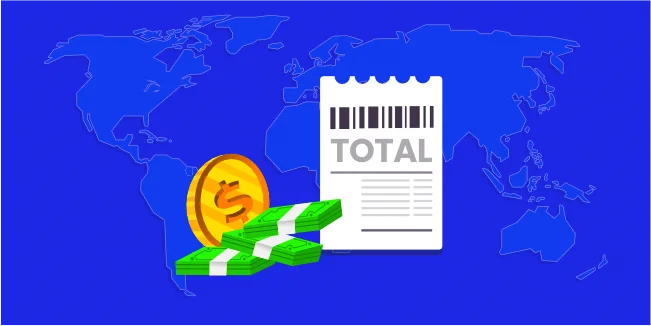The Real Cost of Outsourcing

Cost reduction is a critical and necessary process for almost every software development company or any company in any industry. The opportunity to cut costs from a certain sector is to allocate more cash resources to a less developed department or sector of the company. But it is not simple to save money without consequences. You should remember to skillfully reduce the cash contribution to not harm the reduced part of the business.
Choosing the right software partner can result in a huge jump in productivity and cost savings. At the same time, an ill-advised decision will leave your business at risk of losing its advantage over competitors.
Therefore, it is essential to evaluate the advantages and disadvantages of outsourcing before deciding whether or not to decide on outsourcing services. This step may help you assess if keeping the function in-house or handing off operations will be more beneficial for your business.
In order to make a persuasive argument for outsourcing, certain tools can be utilized. However, the first logical move is always to analyze and compare costs.
When evaluating total cost, remember that getting a similar product or service at a lower price than in-house costs is worth considering.
A critical factor when assessing whether to outsource or not is the foundational idea of differential cost analysis. Understanding the pricing of custom software development is no easy feat, as many elements contribute to its cost.
Here we will discuss what influences this price so you can make an informed decision. Furthermore, you'll gain insight into the various types of custom software available and take advantage of our free cost estimation service for developing your own!
Why Do Companies Outsource Their Projects?
The concept of IT outsourcing is easy to comprehend. The phrase 'outsourcing' originates from English. It describes procuring professional services from an external provider, a Managed Service Provider.
Outsourcing to an external service provider is often more cost-efficient and effective than engaging in-house personnel. By doing so, businesses can concentrate on their core competencies while still receiving the required services.
By outsourcing, you can access the expertise of highly-skilled professionals in specialized fields and industries, ensuring optimal performance. It's a beneficial relationship for both sides. That's why many companies outsource software development!
To know precisely why companies outsource their projects, read our other article and learn more about it!
Let's look at the most critical factors that make outsourcing from an IT service provider a good idea.
Cost Reduction
Outsourcing software development has become increasingly popular due to its speed and affordability. You don't even have to leave the comfort of your home - with just a few clicks. You can gain insight into various outsourcing companies by reading customer reviews and testimonials. In-house hiring is no longer necessary when it comes to this task!
Minimizing Risk
Introducing groundbreaking products inevitably entails risks, even if the business has conducted extensive market research that indicates probable success.
This prospect can seem intimidating and overwhelming for startups or SMEs who have never traversed in this direction, with no tried-and-tested methods of launching successful products.
How to Determine Your Outsourcing Cost?

Calculating and evaluating the cost savings of software outsourcing requires understanding all influencing factors. Understandably, not every software project is priced identically; some require a substantial investment, while others, such as MVPs, can be completed within weeks on a more modest budget.
Before we explore and understand the numerous factors affecting outsourced software development costs, let's consider how you can benefit from it.
The Complexity of Software
Building complex software will inevitably lead to an increased cost, whether you construct it independently or hire a third-party developer. The result is guaranteed to be pricey either way.
Designing complex software requires extensive experience and technical know-how to produce the desired outcomes. When outsourcing, you must look for partners who can confidently handle such projects and have the aptitude and resources to build your product despite its high complexity. As the sophistication of your project grows, so does the demand for skillful teams and the technology stack needed to complete it successfully.
Template-based platforms like low-code and no-code development can provide adequate solutions for basic websites or apps. However, if you want to create a cutting-edge customer experience, custom software development is necessary to build the right product that meets your needs - though it often comes at an increased cost.
Size
Regarding the cost of developing software, in-house and outsourced options are determined by how large the project is. Depending on what kind of user base a company requires, different scales for development can be necessary.
If the project you need to develop is large, your remote product development team must be proportionally larger. As a result of this necessity, the cost to outsource these services will increase by additional cost.
Available Resources
When evaluating the cost of service provider brings with outsourcing, another critical factor that should be considered is your current available resources. It can drastically reduce how many resources you will need for successful outsourcing.
With the help of this information, you can decide how large a team to hire from an outsourcing software development company. As a rule of thumb, most software projects necessitate two developers (senior and mid-level), one QA engineer, and one UI/UX designer for optimal performance. Depending on your project size as well as the resources accessible to you, you can define what number of personnel will meet your specifications from that service provider.
Development Stage
Yet another element affecting software development and outsourcing costs is its stage or scope. Some companies partner up with an external provider right from the start, scaling their product using the same offshoring team. In contrast, others create a Minimum Viable Product (MVP) in-house or through alternate providers before switching to someone else further in production.
Type of Outsourcing
While discussing software development outsourcing, most people believe it's solely focused on product advancement. But there are many different types of development outsourcing that an individual can be involved in, such as:
- Brand New Product - This scenario is if you have a brilliant concept for an entirely new product and must start it from the bottom up.
- Integration of Software - This is when you're ready to introduce a modern feature or API and incorporate a database into your product by building one yourself or with the help of third-party services.
- Modernization of an App - This is the time. When you have a classic application running on old versions or platforms, it must be moved or updated.
Total Costs of Outsourcing

When outsourcing a development team, the bill involves much more than the bid price or their salary; numerous other costs should be considered.
There is no denying the fact that outsourcing is a proven method of reducing operational expenses. Numerous companies have saved hundreds, if not thousands, of dollars, by entrusting their projects to partners from around the world. It has become an effective way for firms to maximize efficiency and garner greater investment returns in today's highly competitive market.
Yet, the expenses associated with outsourcing cost analysis are not always as straightforward as one may think. While some suggest that the total cost is merely what you pay your vendor according to their bid, others might consider it necessary to factor in possible opportunities and additional costs related to this practice.
To reduce the indirect costs that come along with outsourcing, it is critical to look beyond just initial costs and anticipate any hidden fees that may arise.
Let's see how much direct costs are in constructing an in-house team and how hiring an outsourcing service provider relates to this.
In-house Cost
Constructing an in-house development team is a multi-step process that starts with reviewing potential candidates through human resources. The ideal tech squad should consist of developers, UX/UI designers, product architects, QA specialists, testers, and other personnel required to ensure the smooth functioning of the cycle.
One of the biggest advantages remote developers possess over their in-house counterparts is that they do not have to commit to a lengthy contract.
Additionally, you must pay your in-house developer various benefits: sick leave compensation, an annual bonus, overtime payment, and training tax. Not to mention the cost of providing infrastructure and workspace with furniture, refreshments, and more.
Outsourcing Cost
When exploring the costs of outsourcing product development, it's natural to ask: how much will a remote team set me back? Explore this further and uncover what an outsourced development crew could price you.
The team must include three mid-level developers, one designer, and quality assurance personnel to create a straightforward application. Furthermore, a project manager or SCRUM master should be designated as the point of contact for communication between members. At the same time, an analyst will conduct research on the underlying concept.
Regarding outsourcing product development, the primary expenses include salaries/fees paid to employees and contractors, recruitment costs, and hidden miscellaneous fees.
Hidden Outsourcing Costs You Might Not Know About

Most assume that covering the price of outsourcing or paying salaries to remote developers is all they must consider. However, there are other associated costs like knowledge transfer hours for your new team. Don't overlook this cost, as it could provide considerable savings on the total project budget!
Let's expose these common yet surprising overhead costs of outsourcing services:
- Creating a Contract - Establishing a contract for outsourcing is essential to the success of any business endeavor. Every aspect of the agreement should be clearly outlined in the document, ensuring no ambiguity and creating an atmosphere where expectations are fully understood on both sides.
- Server Management - When operating in the digital space, it is essential to guarantee your product remains operational at all times. This could cover anything from infrastructure monitoring and effective scaling to vulnerability discovery and warning creation.
- Knowledge Transfer - As you explain your project to the developers, it may take them two or three days for them to become familiar with the product concept before they can begin working on it.
Summary
Outsourcing is your best bet if you're living on a shoestring budget and can't find an in-house team with the most up-to-date skills and technology.
Cost should not be the only factor to consider when you embark on your outsourcing journey.
By outsourcing, you decrease costs and optimize operations while allowing yourself to concentrate on advancing your startup.
At our offshore outsourcing company, we understand that carefully selecting the right partner is essential for a successful, cost-effective, and productive experience. We have experts who are more than willing to provide you with a free consultation; just let us know when it would be most convenient for you, and we can arrange an appointment!